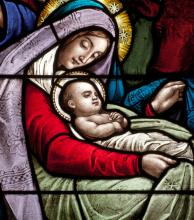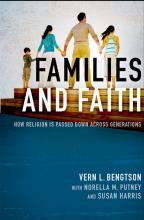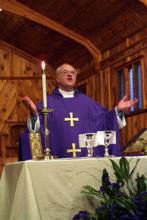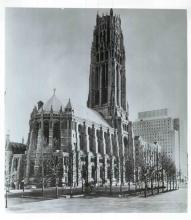Church
WHEN MOST PEOPLE remember George McGovern, the longtime South Dakota senator who passed away in 2012, they probably don’t think first of his evangelical Christian background or see him as a model for evangelicals today.
But McGovern, the Democratic nominee who ran against President Richard Nixon in 1972, actually serves as a worthy exemplar of evangelically rooted social action.
The source of McGovern’s progressive and moral political views may be surprising to some. He was a son of the evangelical church. His father, Rev. Joseph McGovern, was an ordained minister of the Wesleyan Methodist Church (now the Wesleyan Church). It was founded in 1843 as a protest movement against the larger Methodist Episcopal Church. Simply put, they thought slavery sinful and left the denomination to make clear their moral opposition to the “peculiar institution.”
George McGovern enjoyed a good relationship with his father. His childhood was shaped by the rhythms of church life—three or four services on Sunday, prayer meeting on Wednesday night, and daily prayer and Bible readings. The annual family vacation was a two-week campout at nearby Mitchell Holiness Campground. Revival services were conducted nightly.
AS I ATTENDED seminary in my native Chicago, I heard about one senseless death after another. A six-month-old baby shot multiple times with an assault weapon; a young black girl, with promise and a future, caught in the crossfire—all casualties of gang violence.
This violence is further evidence to me that our theology is needed on the streets. A theology that can impact the crisis facing the black community must be relevant to the black community. Theology can never be disengaged from the history of black people, the “isms” that have oppressed us, and the struggles that have birthed our progress. “Relevancy,” for theology, means moving beyond the academy and the church and into the streets, where it becomes our thinking faith in action.
Does our theology have anything to say to African-American gang girls? The formation of girl gangs is rooted in the numerous social ills affecting many urban African-American communities. By taking our theology to the streets, we can offer African-American gang girls an alternative hope and future. Four theological frameworks can aid in that task.
First, a practical theology—thinking faith in action—that models Jesus’ ministry to the marginalized can reach these girls with the message of God’s compassion, peace, and hope by offering a positive relational sisterhood that can replace gang life.

Though we have many stories of people whose lives have been made better, few church leaders would argue that far too many people in the pew make significant spiritual transformations even though they’ve spent years in and around churches.
In my other life, I’m a fitness “coach.” I’m not so much a coach as I am an encourager and friend. The unrivaled aspect of working with people to reach their fitness goals is having a front row seat for transformation. We take pictures to note physical transformations, but changes in physique aren’t the most important ones. The most important transformations are spiritual and emotional ones. And quite frankly, the fitness community does transformations better than churches do.
Why?

Today churches are often rocked with sexual harassment and abuse perpetrated by priests and clergy. Yet, sexual harassment and abuse to clergy, specifically clergywomen, is often swept under the rug.
A 2007 study by the United Methodist Church on sexual harassment and abuse found that nearly 75 percent of Methodist clergy women have experienced sexual harassment and abuse. The common settings for such harassment are church meetings and offices where perpetrators are mostly men and increasingly laity. “Sexual harassment destroys community. This alienating sinful behavior causes brokenness in relationships,” the study states.
Despite the prevalence of increased boundary training and education, the 2007 study found that only 34 percent of small churches and 86 percent of large churches have policies to handle such situations.
In 30 years of ministry, diaconal and ordained, I have seen that church politics, ignorance of or lack of policies and procedures, tolerance for inappropriate behavior, status of perpetrator, and money are obstacles to dealing with sexual harassment and abuse to clergy in a healthy way.

After 36 years of serving churches as a pastor and consultant, I came to a startling conclusion the other day.
Not startling to you, perhaps. I might be the last person to get the memo. But the conclusion drew me up short.
My conclusion: Religion shouldn’t be this hard.

THE WOMEN IN Talking Taboo: American Christian Women Get Frank About Faith aren’t just frank. They are courageous, clever, and wildly passionate.
This anthology, edited by Erin S. Lane and Enuma C. Okoro, asks 40 women under 40 to respond to the question, “What taboos remain in the church at the intersection of faith and gender?” The result is a collection of stories by women of faith (Baptist, Presbyterian, Mennonite, Catholic, Unitarian Universalist, and more) in a variety of roles (pastor, mother, writer, teacher, student, and more).
The women share times they have felt shamed, alienated, discouraged, or alone as women seeking a home in the church. From addressing domestic violence to lust to pregnancy to the role of a woman pastor’s body, the stories are raw in the way first-person narrative calls upon honesty and vulnerability to trump perfect prose or style.
Anthologies often stick to one structural extreme: Either they are rigid and theme-driven, or loose and nomadic. Talking Taboo follows the latter. Lane’s introduction promises no arc of narrative, no solid take-away message. The stories are here, she writes, because women are agreeing to “speak for ourselves.”

“The less engaged people are, the more they tend to criticize. The more engaged people are, they have far less time [and] energy with which to criticize.”
She might as well have completed the above statement with the dismissive wave I heard in her voice. But she didn’t.
She’s a pastor’s wife. Her bread and butter (and heart and soul) are wrapped up in the local church. I have been there. Perhaps the mile I walked in those shoes helps me understand the sentiment. And I think there is a place for tempering unjust criticism from sources that seem negatively biased. That protects people, sure.
But I can’t let it go at that.


Sojo editors looked back at the blogs of 2013 and found that these were the 10 most widely read Sojourner blog articles of the past year.

If there is indeed a “War on Christmas,” those on the anti-Christmas side of the war have lost — big time.
The television pundits, conservative politicians, and talk-radio loudmouths who believe there is a “War on Christmas” should look around, withdraw their troops, and quit screaming. Because if there is a war on Christmas, Christmas has won.
As Christmas approaches, tens of thousands of churches around the country are planning Christmas services and expecting packed pews. Their choirs are rehearsing Christmas music; and church members have taken the Nativity scene figures out of storage and put them on church lawns. Children costumed as kings and shepherds are learning to sing “Away in the Manger.”
Christmas cards with manger scenes are speeding around the country through the U.S. Postal Service or in the form of online animated greetings that play “Silent Night” and show the wise men following the star to Bethlehem.

In a secularized society obsessed with consumerism, entertainment, and modernization, Christianity is often portrayed as being old-fashioned, irrelevant, and useless, but it still serves some very valuable and profound purposes. Here’s why Americans still need it:

As we prepare for the coming of Christ, the third Sunday of advent is celebrated in joy. As followers of Christ, it is reasonable to be exuberant about the birth of our Savior. The amount of happiness that can seep from the soul in response to a virgin birth, a perfect baby boy, and an adorable scene of livestock and shepherds befriending God’s family is immeasurable. Christmas music, Christmas decorations, and yes, even Christmas presents add to the joy and never fail to put a smile on my face.
This past weekend, as I tried to reflect on what it means to be joyful in Christ, my heart was temporarily hardened as I attended a Reentry Arts & Information Fair for returning citizens. I helped host a table for Becoming Church and their Why We Can’t Wait initiative.

When furloughed Peace Corps worker Angela Kissel showed up to support Sojourners’ Faithful Filibuster on Capitol Hill in September, she was surprised to be handed a Bible and invited to read from the podium some of the more than 2,000 biblical verses related to poverty and justice. —The Editors
READING SCRIPTURE outside the Capitol may not seem like a momentous occasion, but for me it was divine. You see, the day before, a well-intentioned pastor told me my place in the church was limited to specific roles because I’m a female. He told me it was against scripture for any female to preach, that roles for leadership are clearly only for men, the “father” figures of the church.
In response, I listed every female prophet and leader. I went through the patriarchal lens in which parts of the Bible are written due to culture and general misogynistic norms of the time. I noted the hypocrisy of highlighting some scriptures while blatantly overlooking others when it doesn’t fit the current agenda. And lastly, I walked through Jesus’ ministry and discussed how he went against cultural norms to illustrate the equality of women to the extent of choosing a woman to tell the world the full story of the gospel.
After an exhausting 65 minutes, we agreed to disagree. We prayed and ended the conversation. I walked away drained and slightly defeated. I wondered why God had put something on my heart and empowered me to speak up, when God knew I’d lose the battle. I also started to question myself and wondered if I should just stop fighting.

IN OCTOBER, Sojourners hosted a Washington, D.C. premiere for the faith community of the extraordinary film 12 Years a Slave. The compelling story about Solomon Northup—a free man from New York who was kidnapped and sold into slavery—is an accurate and well-produced drama, worth seeing for its cinematic merits, but primarily as a start to a conversation about race in America that is long overdue.
In her New York Times review titled “The Blood and Tears, Not the Magnolias,” Manohla Dargis wrote that 12 Years a Slave “isn’t the first movie about slavery in the United States—but it may be the one that finally makes it impossible for American cinema to continue to sell the ugly lies it’s been hawking for more than a century.” The film reveals how morally outrageous the slave system was, and it is very hard to watch.
The enslavement of millions of people of African descent by white Americans was always violent, and too intense for most white people to really accept the truth. Most white people, white Christians, and white churches tolerated slavery for 246 years. This historically horrendous evil existed because we tolerated it. That’s why evil always continues to exist: because we tolerate it.
What do we tolerate today? We tolerated the gratuitous evil of slavery, and still tolerate the devaluing of black lives. We tolerate completely dysfunctional urban schools, but would we still do so if they were full of young white children? We tolerate a criminal justice system where the racial disparities between white and black arrests, convictions, and sentencing are abundantly clear, resulting in the mass incarceration of men of color. We tolerate murder rates for people of color that we would never tolerate for whites. We tolerate racial profiling of young black men, with results that we would never accept for our white teenage boys. And we tolerate deliberate and clear political efforts to diminish the votes of minority communities.
Methodist minister Rev. Frank Schaefer (not to be confused with Frank Schaeffer) has come up against what some might call a conflict of interest in living out his call as a minister of the gospel. Some might even call his experience a crisis of faith, but for Schaefer and his son, Tim, the struggles they have faced in recent weeks and months have yielded beautifully unexpected blessings.
Schaefer's troubles with the larger Methodist Church go back some six years to when he performed a wedding ceremony for Tim, who is gay. Although his son realized this would present Schaefer with a dilemma (the United Methodist Church does not allow their ministers to conduct same-sex marriages), he also knew that it would hurt his father deeply not to be asked to perform the ceremony, regardless of whom he was marrying.
The wedding was performed in Mass., where same-sex marriages are legally recognized.
Though it took some time, charges were brought against Schaffer within the denomination, and he has recently had his license for ministry suspended. He is now facing an ultimatum: either he has to renounce his support for the performance of same-sex marriages or he will be defrocked within a month.

Baby boomers might not be that different from the Greatest Generation when it comes to religion. Like their parents, many boomers will attend religious services later in life. But unlike their parents, baby boomers are more likely to describe a deep, intense spiritual connection from a personal experience than a religious one from an institutional practice.
Many of them don’t know it yet, said a researcher at this week’s annual conference of the Gerontological Society of America in New Orleans, but growing old, regardless of what generation you belong to, brings on dramatic changes that can propel people to seek new meaning in religious services.
Vern Bengtson is the author of the recently published Families and Faith with co-authors Susan Harris and Norella Putney. He based his findings and predictions on a 35-year longitudinal study of 350 Southern California families and interviews with a subset of 156 families. The study’s scope spanned six generations from 1909 to 1988. The conversations explored spirituality, religious beliefs, intensities, and practices.

In a tech newsletter I read, two colleagues addressed the end of the world of the personal computer that they spent three decades mastering.
There will be no more building PCs from scratch, no more tinkering with the innards, no more fine-tuning the operating system.
“The evolution of the PC industry over the last several years has not been good to the old-school PC professional, particularly for those whose careers have been heavily hardware-oriented,” said the writer.
Many clergy and lay leaders are in exactly this position.

A former archbishop of Canterbury has warned that the Church of England faces extinction in less than 25 years unless it can attract more young people now.
Talking to 300 churchgoers in Shropshire, West England on the eve of a church agreement to start a campaign to evangelize England, Lord George Carey said: “We ought to be ashamed of ourselves. We are one generation away from extinction and if we do not invest in young people there is going to be no one in the future.”
Carey was Archbishop of Canterbury and leader of the world’s estimated 85 million Anglicans from 1991 until 2002 when he joined the House of Lords (Britain’s Upper Chamber of Parliament).

On a Greenwich Village street where male prostitutes seeking customers shout out their dimensions, I walked past an open but empty church on my way to the subway.
In times past, flocking to church on Sunday morning was a beloved family routine, even here in bad old Gotham. Now they’re trying nontraditional worship on Sunday evenings.
It’s a struggle, both here and elsewhere in the 21st-century Christian world. Buildings with “beautiful stones and gifts dedicated to God,” as Luke described the temple in ancient Jerusalem, are falling into disuse and disrepair — not because Caesar attacked and took revenge on an alien religion, but because the world changed and gathering weekly in “Gothic piles” no longer seems necessary for finding faith.